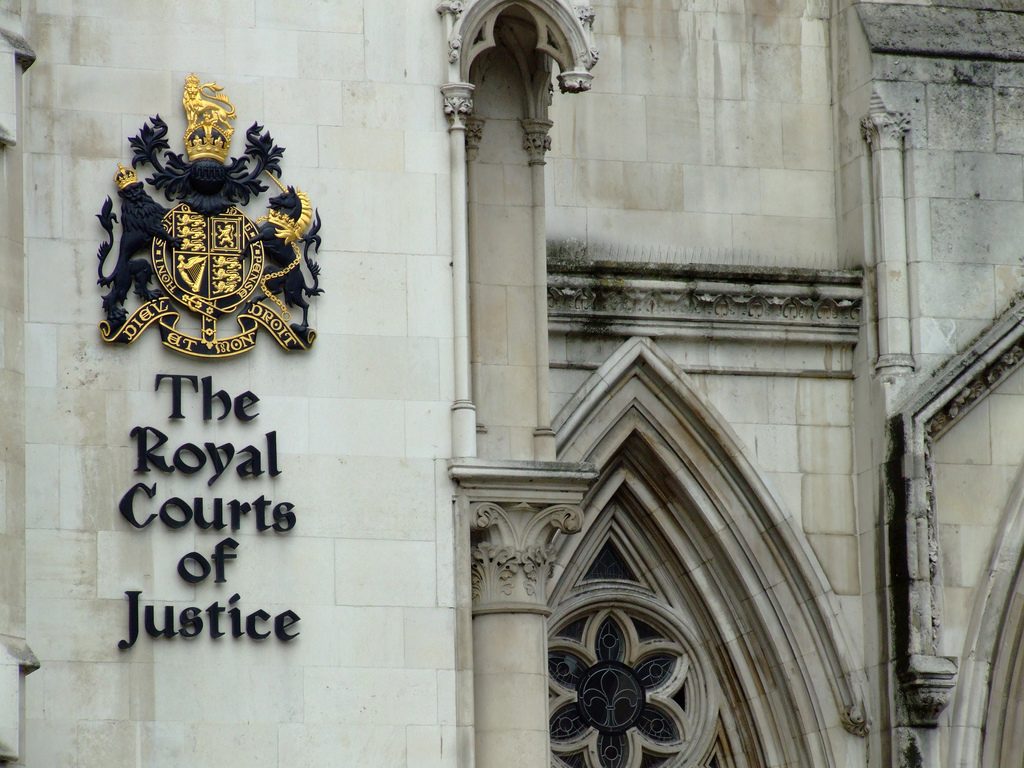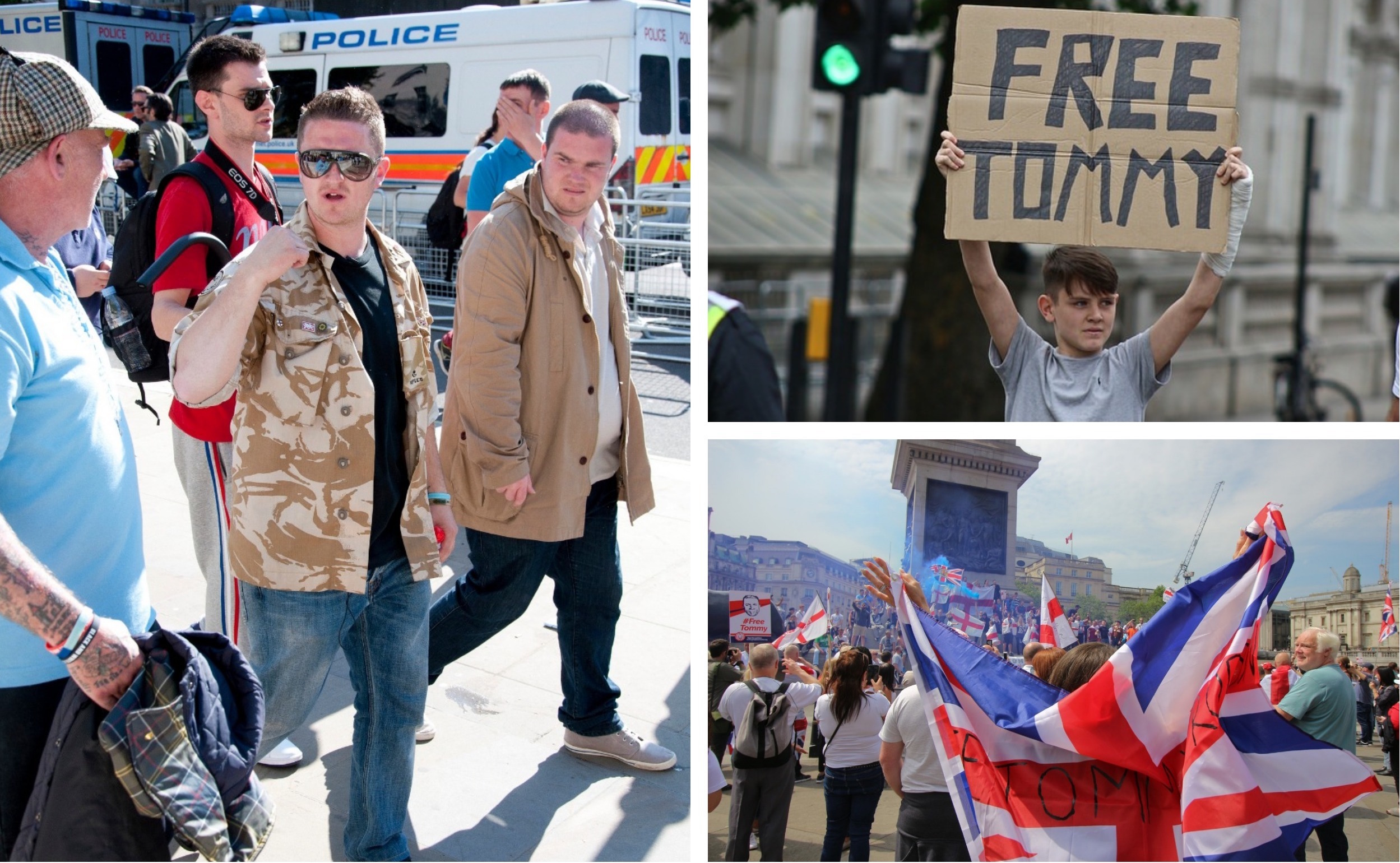Former English Defence League leader Tommy Robinson has been jailed for nine months after being found guilty of contempt of court.
The 36-year-old, whose real name is Stephen Yaxley-Lennon, was last week found guilty of interfering in the May 2018 trial of a sexual grooming gang at Leeds Crown Court.
He had previously been sentenced to 13 months in prison after he pleaded guilty to the offence in May last year.
But Robinson then took the matter to the Court of Appeal, where the judges ruled he had not been given a fair trial, as the whole process had been rushed through and his lawyer was unable to defend him properly. This meant a second trial had to take place, which ended last week in Robinson’s conviction.
Robinson and his supporters insist his freedom of expression is being unjustly curtailed. Arriving at his sentencing hearing on Thursday (July 11) he wore a T-shirt emblazoned with the words “convicted for journalism” which also compared the UK to North Korea.
The Society of Editors, a network of more than 400 senior journalists, has said this claim is a “dangerous distortion of the truth”.
Why is it illegal to report on trials in some circumstances? And what does it have to do with our human rights? RightsInfo explains.
Why Was Tommy Robinson Jailed In The First Place?

A protest in support of Tommy Robinson. Image Credit: C Suthorn / Wikimedia.
It was all to do with a Facebook Live he set up outside Leeds Crown Court while a jury considered their verdict in a case involving members of a sexual grooming gang.
This footage had been broadcast while the jury in a second trial (of three in total), concerning members of the same gang, was considering its verdict. The judge in the second trial had placed an order postponing details of any of the trials from being reported until all trials had concluded.
This was to prevent jurors in the later trials from being influenced by media coverage of the earlier ones, which would undermine the fairness of the trial. The very act of making the broadcast meant that Robinson was breaching this restriction, which amounts to contempt of court – an offence punishable by an unlimited fine and up to two years in prison.
He’d also committed a contempt of court outside Canterbury Crown Court one year earlier and, at the time, had been given a three month suspended sentence.
In May 2018 though, when he was found guilty of contempt again, he was given 10 months for the incident in Leeds, and the three months from Canterbury were activated – meaning he was set to serve a total of 13 months.
What Is Contempt of Court And Why Does It Matter?

Royal Courts of Justice. Image Credit: R/DV/RS/Flickr.
Contempt of court is essentially a broad term for a range of offences against the courts and justice system.
Some offences are set out in specific laws – like the 1981 Contempt of Court Act – and others are part of common law, which means they come from judicial precedent and custom, rather than specific acts of Parliament.
There are many different activities which fall under contempt but, basically, it’s all about protecting our right to a fair trial.
Our human rights (and the ethos of democracy) say that we’re all entitled to a fair trial – and it’s a right which goes all the way back to Magna Carta in 1215.
Nowadays, the right to a fair trial is a more formal part of our law and is set out in Article 6 of the Human Rights Convention, which was made into UK law by the Human Rights Act. Essentially, one way contempt laws protect this right is by making sure there is no “substantial risk of prejudice to the administration of justice”.
This means people and publications aren’t able to publish anything which might influence a potential jury’s decision – so no speculating as to who did (or didn’t) do the crime or campaigns by special interest groups trying to secure a particular decision.
[It is contempt to publish anything which creates] a substantial risk of prejudice to the administration of justice.
Contempt Of Court Act, Section 4
It’s also key to remember that this applies regardless of a person’s intentions – it doesn’t matter if you didn’t mean to do it.
People are still allowed to report on trials, but there are specific rules about how the media reports criminal proceedings to make sure the coverage is fair and accurate.
What’s more, the judge can also impose additional reporting restrictions, which sometimes means the details of the trial aren’t revealed until later, if they feel reporting at the time would damage the right to a free trial.
In Robinson’s case, he streamed an hour-and-a-half of footage outside the court which had been viewed online 250,000 times. Judges remarked that it encouraged “vigilante action” by calling on viewers “to harass a defendant by finding him, knocking on his door, following him, and watching him”.
This created “a real risk that the course of justice would be seriously impeded”, the judge said.
What About Freedom of Expression?

Image Credit: Jon S / Flickr
The right to freedom of expression is protected by Article 10 of the Human Rights Convention, enshrining the media’s ability to report news without state interference.
However, it is a qualified right. This means that public authorities can take proportionate steps to curtail this freedom in order to maintain the authority and impartiality of the judiciary, among other reasons.
In her judgment last week, Dame Victoria Sharp said the reporting restrictions were justified on grounds of “maintaining the authority and impartiality of the judiciary”. In her words: “The rule of law demands that those who act in such a way as to subvert due process should be held to account, whether or not they actually threaten the fairness of the end result.”
Tommy Robinson insists that he is a journalist and was reporting a case ignored by the “mainstream media”.
Reacting to his claims, Society of Editors executive director Ian Murray said that in reality Robinson had broken the law by ignoring the laws of contempt that any junior reporter working for a reputable news provider would be aware of.
“While anyone can claim to be a journalist in this country, and there is no appetite nor should there be for the licensing of journalists in the UK, the mainstream British media adheres to the laws of the land, is correctly regulated and ensures its journalists are highly trained,” he said.
“I am not aware that Robinson has any formal training as a journalist, and to claim his trial and sentencing is an attack of journalism itself is a farce.”







